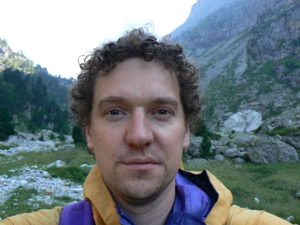
Jonathan’s research interests are focused around understanding the complex issues which surround human-nature interactions in wild spaces and how they relate to the long-term success of nature conservation, with particular reference to nature-based solutions, natural process protection and functional connectivity in mountainous regions. He is especially interested in how scientific knowledge can be validated, using ground truthing, and combined in complex real world protected area scenarios with information from inclusive participatory processes.
He has recently completed an MSc thesis looking at how GIS-based natural landscape integrity mapping combined with graph theory can be used to identify and prioritise areas for connectivity conservation in the Pyrénées. Jonathan is currently looking at how changes in land use and climate can be incorporated into such models in combination with stakeholder opinions, and how this overall approach can be used to optimise the effectiveness of nature conservation interventions such as species reintroductions and natural regeneration.
For the last three years Jonathan has been working on the Great Mountain Corridor Initiative, a landscape scale connectivity conservation project which aims to restore natural landscape quality in mountainous regions in western Europe.
He is a member of the IUCN-WCPA Mountains Biome: Mountain Protected Areas Network and on the management committee for a European COST Action on aerial corridors.
Jonathan was winner of the 2013 Royal Geographical Society’s (with IBG) Planning and Environment Research Group (PERG) prize. The prize is an annual postgraduate award for the best Masters dissertation in the United Kingdom in environmental planning, policy and governance.
Jonathan is a qualified International Mountain Leader and mostly loves wandering ‘off-grid’ into the mountains in search of adventure.
